Current News
/ArcaMax

Many household cleaners don't protect against norovirus, report says
ATLANTA — The U.S. has seen a slow surge of norovirus, the country’s leading cause of foodborne illness, with the Center of Disease Control advising caution and higher levels of cleanliness. However, norovirus can defeat most household cleaners, according to a National Institute of Food and Agriculture report.
“While convenient, the ...Read more
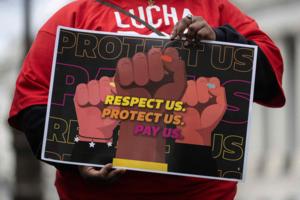
Minimum wages are increasing in nearly half the states this year
The minimum wage will increase in nearly half the states this year even as the federal wage floor remains stuck at $7.25 per hour.
In many states, the minimum wage is automatically adjusted upward as inflation rises. But voters in several states, including deeply red ones such as Alaska and Missouri, chose in November to significantly increase ...Read more

Colorado's historic wolf reintroduction faces barrage of challenges 1 year after first paws hit the ground
DENVER — Depending on who’s talking, Colorado’s wolves are an existential threat to ranching, an imperiled native species crucial to a healthy ecosystem, a ruthless predator that kills for sport or a beautiful species that enriches lives.
Despite a full year passing since the first reintroduced canines put paws on the ground, tensions ...Read more
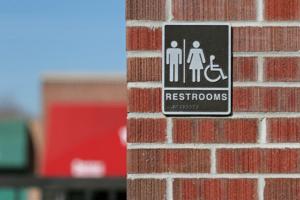
Why some transgender Georgians are anxious visiting public bathrooms
ATLANTA — Four years ago while shopping at an Atlanta Kroger, Chelsea Vincent had a crucial decision to make when nature called.
Men’s or women’s?
“There was a lot of anxiety going into either bathroom,” the 33-year-old recalled. “It was a total crapshoot into which bathroom I was going into that would get me in the least trouble.�...Read more

Can medical schools funnel more doctors into the primary care pipeline?
Throughout her childhood, Julia Lo Cascio dreamed of becoming a pediatrician. So, when applying to medical school, she was thrilled to discover a new, small school founded specifically to train primary care doctors: NYU Grossman Long Island School of Medicine.
Now in her final year at the Mineola, New York, school, Lo Cascio remains committed ...Read more
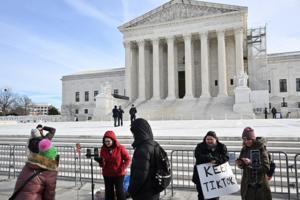
TikTok ban won't work, groups argue, in hope of eleventh-hour reprieve
WASHINGTON — Free-speech and tech groups are beseeching the Supreme Court to invalidate a law that would effectively ban TikTok after the court appeared inclined to uphold the law during oral arguments.
“A TikTok ban would hurt American businesses and consumers more than TikTok itself ever has,” said Ash Johnson, senior policy manager at ...Read more
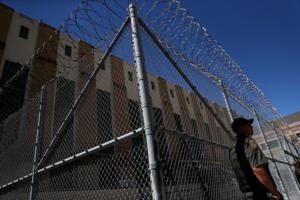
Prison abuse, deaths and escapes prompt calls for more oversight
Rampant sexual abuse by guards at women’s prisons in California. An inmate suicide that went unnoticed for 18 hours in Washington state. Multiple jail breaks in Pennsylvania.
Prisons and jails across the United States are overcrowded and understaffed, jeopardizing the safety of incarcerated people, correctional officers and surrounding ...Read more
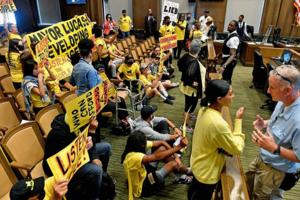
Missouri Republicans target Kansas City housing law praised by renters, criticized by landlords
Kansas City renters and their advocates celebrated last January, cheering as the City Council approved new protections targeting discrimination on the basis of someone’s income or criminal history.
The rules may not survive another year.
Missouri Republican lawmakers want to overturn the Kansas City ordinance amid a backlash from vocal ...Read more

Black man assaulted by white nationalist group Patriot Front wins nearly $2.8 million in court
BOSTON — The Black man who was shoved and assaulted by a white nationalist group in downtown Boston on Fourth of July weekend won nearly $2.8 million in damages against the group, Patriot Front.
Charles Murrell III, a musician and teacher, sued Patriot Front in August 2023 in federal court. The lawsuit targeted both the group itself as well ...Read more
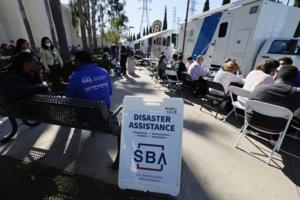
FEMA centers open amid anxiety over recovery from the Eaton, Palisades fires
Jared Robbins walked up to a row of FEMA trailers in Pasadena with a sheet of paper where he had written some of the most pressing questions about his situation after his Altadena home was burned by the Eaton fire less than a week ago.
The Federal Emergency Management Agency opened two disaster recovery centers Tuesday to assist people like ...Read more

NY Times, other newspapers ask federal judge to reject OpenAI, Microsoft challenges to copyright suit
NEW YORK — Lawyers for The New York Times, the Daily News and other newspapers Tuesday asked a Manhattan judge to reject an effort by OpenAI and Microsoft to dismiss parts of their lawsuits accusing the tech giants of stealing reporters’ stories to train their AI products.
The News, its affiliated newspapers in Media News Group and Tribune ...Read more

L.A. County to create fund for wildfire victims
As fire victims flood GoFundMe for help with rebuilding, the L.A. County government will create its own fund for residents who lost their livelihoods or whose homes or businesses were reduced to rubble by devastating wildfires.
The county Board of Supervisors, which met Tuesday for the first time since fires decimated large swaths of the county...Read more

LA fire officials could have put engines in Palisades before the fire broke out. They didn't
LOS ANGELES — As the Los Angeles Fire Department faced extraordinary warnings of life-threatening winds, top commanders decided not to assign for emergency deployment roughly 1,000 available firefighters and dozens of water-carrying engines in advance of the fire that destroyed much of the Pacific Palisades and continues to burn, interviews ...Read more

A week after LA firestorms began, the threat continues as the unprecedented losses sink in
LOS ANGELES — A week after flames leveled huge swaths of Pacific Palisades and Altadena, Southern California remained under a severe fire threat as residents still struggled to comprehend the scale of the loss.
An army of firefighters spent Tuesday putting out small fires before they got out of control, and continued building containment ...Read more

Biden creates 2 vast national monuments during final week in office
President Joe Biden on Tuesday created two new vast national monuments in California’s desert and far north that protect lands considered sacred by tribes, bolstering his conservation legacy days before leaving office.
Biden signed proclamations establishing the 624,000-acre Chuckwalla National Monument south of Joshua Tree National Park in ...Read more

$20 billion Delta tunnel plan wins endorsement from Silicon Valley's largest water agency
SAN JOSE, Calif. — Gov. Gavin Newsom’s $20 billion plan to build a massive, 45-mile long tunnel under the Sacramento-San Joaquin Delta to make it easier to move water from Northern California to Southern California won the endorsement of Silicon Valley’s largest water agency on Tuesday.
By a vote of 6-1, with director Rebecca Eisenberg ...Read more
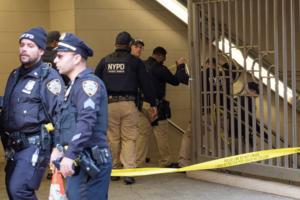
Gov. Hochul putting a cop on every subway train in NYC at night, installing more safety barriers
NEW YORK — Gov. Kathy Hochul said the state will be paying to put police on every overnight subway train in NYC for the next six months, “to reduce crime and the fear of crime” in the MTA’s mass transit system.
“I want to see more uniformed police officers,” Hochul said Tuesday in her annual State of the State address. “Not just ...Read more
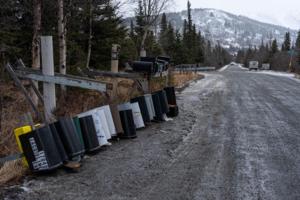
Anchorage power outages extend to 3rd day in wake of 'extreme' warm January storm
ANCHORAGE, Alaska — Hundreds of Anchorage residents remained without power for a third day following a rare January storm that brought record warmth and hurricane-force winds over the weekend.
Chugach Electric Association said the extensive repairs necessitated by Sunday's storm means some members may not get power back until Wednesday.
The ...Read more
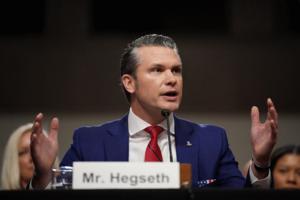
Defense nominee Hegseth sticks to script at his confirmation hearing
WASHINGTON — Pete Hegseth weathered repeated efforts by Democrats on the Senate Armed Services Committee to assail his lack of qualifications to lead the Pentagon on Tuesday, buoyed by praise from Republicans of President-elect Donald Trump’s “out-of-the-box” pick to serve as secretary of Defense.
Partisan lines of support and hostility...Read more
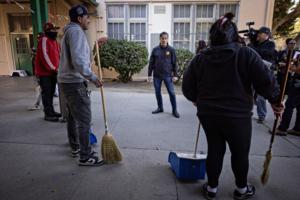
Scores of LA teachers lose homes; students from 2 burned-down LA schools to resume class
LOS ANGELES — Students from two burned-down Los Angeles elementary schools will resume classes Wednesday in new locations in neighborhoods near fire-ravaged Pacific Palisades as employee unions estimate that at least 150 district staff, including many teachers, have lost their homes.
Students who were attending Palisades Charter Elementary ...Read more
Popular Stories
- Here's what happens with TikTok if Supreme Court upholds ban
- Black man assaulted by white nationalist group Patriot Front wins nearly $2.8 million in court
- San Diego Gas & Electric power outages hit 5,620 customers as Santa Ana winds pick up
- $20 billion Delta tunnel plan wins endorsement from Silicon Valley's largest water agency
- Lori Daybell's Idaho case may offer path to dump death penalty in Kohberger murder trial





